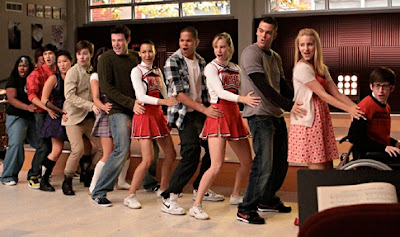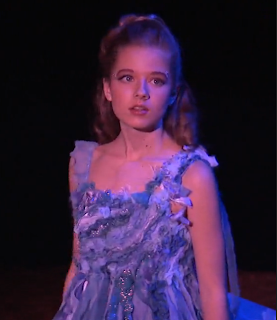 |
| Does this picture break the 4th Wall for you? |
Hunger Games is good discussion fodder because it's very, very popular; it's part of a trilogy of books and a coming tetralogy of films; and it has enough good points to build on (along with bad points to deal with).
How you approach it depends on the teen, of course. There are people who respond to any attempt at discussion with idiocies like "Why do you have to analyze everything? Why can't you just enjoy it?" People who say this may not be stupid (though that is a distinct possibility). They may be intellectually insecure or lazy, and trying to conceal this in an application of "offense is the best defense."
If the kid is young enough you can make a post-viewing discussion a precondition for letting them see "Hunger Games." If they're older...well, you may just have a dud on your hands. Sorry about that.
I do know people who consider any discussion of works of art a waste of time because they think the purpose of most art is frivolous--killing time, frothy entertainment. This can be worked with, though it's still hard. But let's get back to "Hunger Games" in particular.
Since I'm talking about talking about this film, now I'm going to include spoilers freely. Don't go on until you've seen it unless you don't care. Forewarned...
==========MANY SPOILERS FOLLOW ===========
There are two equally valid ways to talk about a movie like "Hunger Games:" as a film, and as philosophy--that is, as a reflection on life.
As a film, "Hunger Games" is an example of how you can tackle turning a book into a film--and in particular how you can make a film that coheres as a movie while at the same time leading to more films in the series (every TV series faces this challenge).
Practically speaking, a film can't be any longer than "Hunger Games" is. So what does your teen think of the choices the film makes in what to include from the book and what to leave out? If your teen thinks something left out should have been left in--such as, say, Rue's developing relationship with Catniss during the training period--what should be left out in order to make room for that?
Then, considering what is the same in book and movie, what about the fact that Catniss winds up not having to kill anyone we like, or anyone defenseless whether we like them or not? She does have to make a tough decision when it comes to, in effect, being ordered to kill Peeta. But that's it. This is an example of a plot designed to look tough that actually is not so tough. What if she'd had to choose between killing Rue or Peeta? It could have easily worked out that way.
Ask your teen what she would have done at each crucial decision point in Catniss's story. You can also see whether she caught the fact that Catniss doesn't love Peeta? She likes him, she's grateful to him for his acts of kindness earlier in their lives. But gratitude ain't love.
Also, it seems like Catniss hadn't been teaching Primrose how to hunt. Why not? Would your teen have made that choice? If your teen had been in Primrose's position, would she have asked Catniss to teach her? [I'm only talking about the movie here.]
Taking a step back, is this future society plausible? For example, if the Capitol City denizens are so decadent, who are the highly disciplined military/police forces? They aren't lounging around decadently. The Roman Empire wound up hiring "barbarians" for their military--who wound up taking over eventually. A college-bound teen might want to explore this to see what are the parallels between real empires like the Roman one and the world of Hunger Games.
And what about the scientists, engineers and technicians needed to maintain a very, very advanced technological infrastructure? That all takes discipline and hard work, not dilettantish decadence. Where are these people?
And, like, what are those killer dogs made of? CGI can't bite people. That's tech way beyond anything we can imagine.
A lot of teens, fed on a rich diet of CGI-stuffed scifi/action movies, may not realize what's science and what's fiction. Your teen should realize that those lethal out-of-thin-air dogs represented tech waaay beyond most other stuff in the film. That doesn't make it invalid to use; but you should realize the difference, and so should your teen.
Which brings us to using Hunger Games to help your teen learn about the art of movies. You can talk about casting, screenwriting, cinematography, lighting, sound, music, editing, CGI, direction, mise en scene--even to technical details like scene transitions (cuts, wipes, fade out/fade in). And you can talk about the Fourth Wall (that divides the audience from the "stage"). And about POV (Point of View).
Does Hunger Games ever break the Fourth Wall, intentionally or otherwise (it's intentional when the actor turns to the audience and addresses them directly; it's unintentional when the shadow of a boom mike drifts into view). What's Hunger Games' POV? Are we seeing everything through Catniss's eyes? (we aren't--but where and when are we not, and is that a good idea here?).
What about the last fight on top of the Cornocopia, when the Evil Boy makes a little existential speech about knowing he's dying, regretting the fact that his whole life has been about training to be a killer, but thinking he might as well kill once more? Why did the screenwriter include that little speech? Why? Did it complicate things for Catniss, who has trouble killing anyway? Does it tell us more about this society? Does it make the Evil Boy a little sympathetic, and is that a good thing?
Look at the credits at the end with your teen. See if she knows what the different jobs are. Look up the ones you don't recognize on Wikipedia or suchlike. Who's a Best Boy? A Key Grip? A Second Unit director? See what locations were used.
Some say casting is 80% of a movie. What would the film have been like if they'd used someone besides Jennifer Lawrence as Catniss? I heard Chloe Grace Moretz wanted the part. Would she have been too young? She's one of the most athletic young female stars in Hollywood, though of course Lawrence is no slouch. But she's also, like, half a foot shorter. Would that have made a difference?
It's not like Hunger Games is a towering masterpiece of a movie. But it isn't terrible either. And assuming it's one of your teen's favorite movies, you can use it as a gateway to thinking about society, real world morality, the future, and filmmaking.







